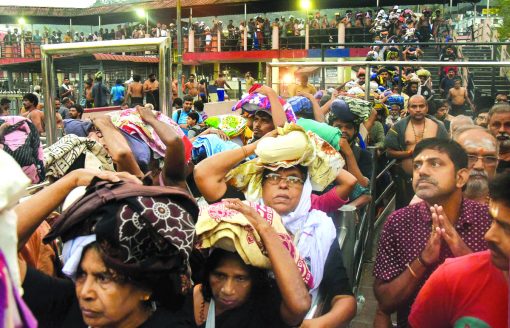The decision has reignited the regressive religious campaign led by the RSS-BJP legion, and for them, Sabarimala has become no less than a battleground. Consequently, the region has been witnessing a series of violent protests ever since the judgement was passed. In light of the violence caused by these protests, Section 144 of The Code of Criminal Procedure was imposed in Sabarimala and nearby areas ahead of the Chithira Avittom Pooja. The protestors, however, decided to go ahead with the agitation despite Kerala High Court’s order that no protests or demonstrations should be held at Sabarimala, holding that it was not a place for such activities.
In the month of November alone, around 69 people were arrested for allegedly breaching Section 144 imposed in the vicinity of Sabarimala. The protests, however, continue to intensify as the Kerala unit of BJP started an indefinite relay hunger strike before the Kerala secretariat on December 03, to press demands such as the lifting of prohibitory orders against protesters and withdrawal of cases against party leaders.
In tune with BJP, the Congress-led UDF is also blaming the LDF government for not handling the situation appropriately. “Centuries-old practices and rituals that are followed at Sabarimala temple must be protected. The Devaswom board has failed in its duty to carry out its functions correctly and the state government is in a rush to implement measures without considering the option of bringing an ordinance. The duty of the Devaswom Board is to protect the interests and well-being of the devotees, not that of Pinarayi Vijayan,” said the UDF leader Ramesh Chennithala.
Not giving in to the pressure of protests, the LDF government is firm on its decision that the government is duty-bound to implement the Supreme Court order. “I will not allow the Sangh Parivar to make Sabarimala into another Ayodhya. There is a concerted bid to defame the state citing Sabarimala,” said Kerala’s Chief Minister Pinarayi Vijayan.
The Kerala government has also announced a million women wall on the New Year’s Day to prevent the state from “sliding back into medieval madness”. Chief Minister Pinarayi Vijayan has said that a women wall would be formed on January 01 from the Northern district of Kasargode to the state capital, Thiruvananthapuram in order to garner support for the state government. The CM said that the decision was made after a meeting with various Hindu organisations. “This is against the attempts to destroy the renaissance values and to spread awareness to people. The various communities are joining hands to make a big intervention that the country should make note of, and understand that Kerala society cannot be sent back to the old dark ages by anyone; we will not allow that,” he said.
Among the 190 Hindu organisations invited for the meeting, 176 had accepted and a few, including the Nair Service Society did not turn up.
Speaking to the Indian Cultural Forum on the issue, activist and academic Meera Velayadhun said, “In Kerala, notions of equality emerged from the missionary era itself. Gender equality was a key part of social reform, anti-caste, nationalist and communist movements and women’s struggles played a distinct role in them. It was the wide participation of women in these varied movements in Kerala that expanded democratic dialogues and widened democratisation. However, all gains of the past are now under attack and for the first time in modern Kerala’s history, a violent, anti-women struggle has been launched by communal forces and organisations opposing the Supreme Court verdict on Sabarimala. The violence unleashed by these communal organisations also includes a section of women, who propagated their own exclusion as “tradition”. At the time when a political template is sought to be built on the basis of mob violence and anti-women communal agenda, democratic dialogues are difficult.”
The announcement of a women wall at this time, Velayadhun said, can act as a peaceful form of protest against the violent attacks on women. “It is time for women from all sections of society to hold wide discussions among themselves, oppose the newer forms of patriarchal ideologies that threaten the constitutional rights of women and more significantly, come together so that these rights are part of the on-going political debates,” she concluded.
Ramesh Chennithala, leader of the opposition party UDF, has come out against this announcement. “The government order is another blunder like the salary challenge. The order is applicable to not just the government, semi-government and public sector undertakings, but also to members of ASHA, Kudumbashree, Anganwadi, and MGNREGS. Its tone makes participation compulsory,” he said.
There are also reports doing round that the sangh parivar is getting ready to form another women’s wall to counter the LDF-led women’s wall.
Daniya Rahman is a member of the editorial collective of the Indian Writers’ Forum.
Courtesy: Indian Cultural Forum

